Understanding the balance between motivation and discipline is crucial for personal growth. Motivation initiates action, while discipline ensures consistent effort. This article explores their distinct roles, the importance of psychological traits like resilience, and effective strategies for achieving sustained personal development. By examining common pitfalls, readers can enhance their growth journey.
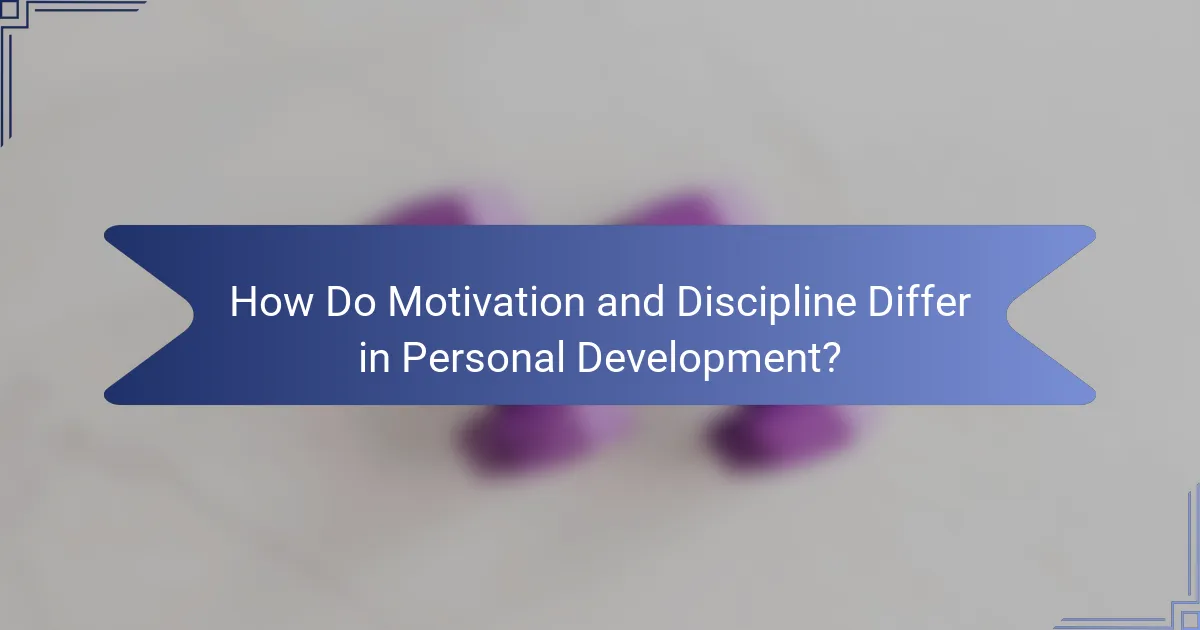
How Do Motivation and Discipline Differ in Personal Development?
Motivation and discipline are distinct yet complementary forces in personal development. Motivation drives initial action, while discipline sustains effort over time. Motivation often fluctuates based on emotional states or external stimuli, whereas discipline is a consistent practice that builds habits.
Motivation can be seen as the spark that ignites the desire for growth, influenced by factors like personal goals and aspirations. Discipline, on the other hand, is the commitment to follow through on those goals, regardless of feelings.
Research shows that individuals with high discipline often achieve more sustained success than those who rely solely on motivation. This highlights the unique attribute of discipline as a critical factor in long-term personal growth.
In summary, understanding the interplay between motivation and discipline can enhance personal development strategies, leading to more effective and lasting results.
What Psychological Theories Explain Motivation?
Psychological theories explaining motivation include Maslow’s Hierarchy of Needs, Self-Determination Theory, and Goal-Setting Theory. These frameworks highlight how needs, intrinsic motivation, and specific goals drive personal growth. Maslow emphasizes fulfilling basic needs before higher-level aspirations. Self-Determination Theory focuses on autonomy, competence, and relatedness as key motivators. Goal-Setting Theory posits that clear, challenging goals enhance motivation and performance. Each theory offers unique insights into the psychological mechanisms that foster motivation, facilitating personal development strategies.
What Role Does Discipline Play in Achieving Goals?
Discipline is crucial for achieving goals as it fosters consistent action and focus. Unlike motivation, which can fluctuate, discipline ensures sustained effort towards objectives. Studies show that disciplined individuals are more likely to reach their goals due to their ability to prioritize tasks and resist distractions. This consistency builds habits that support long-term success, making discipline a unique attribute in personal growth.
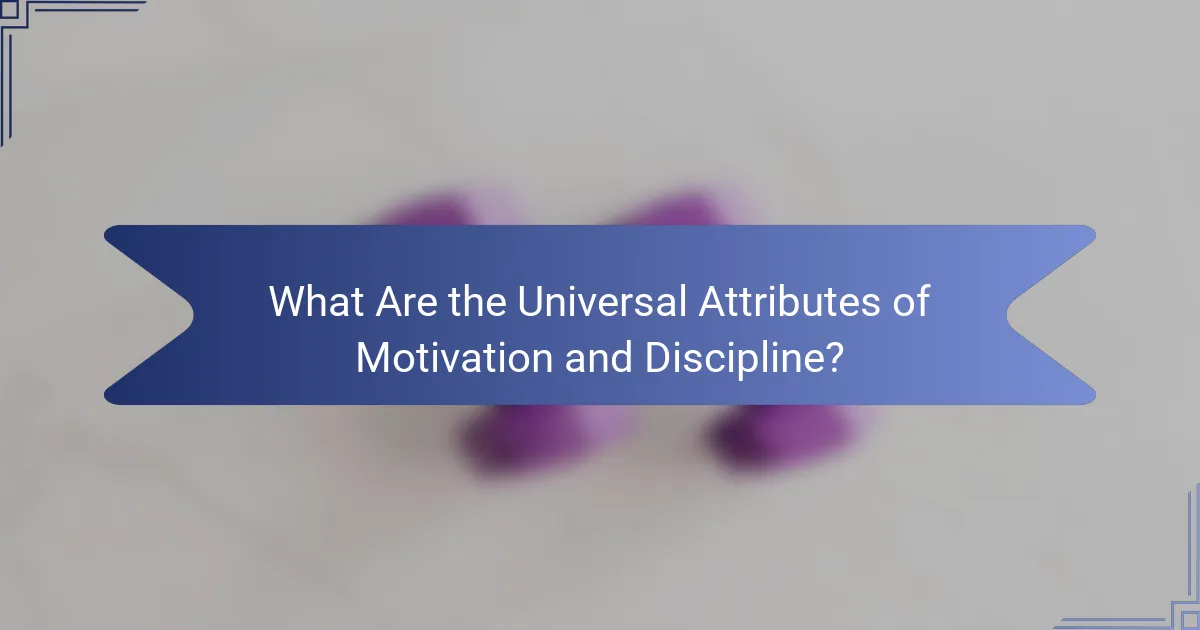
What Are the Universal Attributes of Motivation and Discipline?
Motivation and discipline are essential for personal growth, each possessing universal attributes. Motivation drives individuals toward goals, characterized by intrinsic and extrinsic factors. Discipline, on the other hand, involves consistency and self-control, enabling sustained effort. Both attributes interact; motivation fuels the desire to act, while discipline ensures follow-through. Understanding their synergy can enhance personal development strategies.
How Do Intrinsic and Extrinsic Motivations Influence Behaviour?
Intrinsic and extrinsic motivations significantly shape behaviour by influencing decision-making and goal achievement. Intrinsic motivation arises from internal satisfaction, driving individuals to engage in activities for personal fulfillment. In contrast, extrinsic motivation stems from external rewards, such as praise or financial incentives, which can enhance performance but may undermine intrinsic interest over time. Understanding these dynamics enables individuals to harness both types of motivation for effective personal growth and discipline.
What Are the Key Components of Self-Discipline?
Self-discipline consists of focus, self-control, and persistence. These components enable individuals to pursue long-term goals despite distractions and obstacles. Focus helps maintain attention on tasks, while self-control regulates impulses. Persistence ensures consistent effort over time, reinforcing the importance of discipline in personal growth.

What Unique Attributes Distinguish Motivation from Discipline?
Motivation is driven by internal desires, while discipline relies on external structures. Motivation ignites action through emotional energy, whereas discipline sustains it through consistent habits. Unique attributes include motivation’s transient nature versus discipline’s enduring commitment. Understanding these distinctions enhances personal growth strategies.
How Does Goal Setting Impact Motivation Levels?
Goal setting significantly enhances motivation levels by providing clear objectives and a sense of direction. When individuals establish specific, measurable goals, they create a roadmap that fuels their drive and commitment. Research shows that goal-setting can increase performance by up to 25%, as it fosters accountability and focus. Additionally, achieving smaller milestones boosts self-efficacy, further elevating motivation. This psychological strategy aligns personal aspirations with actionable steps, reinforcing discipline and sustaining momentum in personal growth.
What Are the Psychological Mechanisms Behind Self-Control?
Self-control relies on psychological mechanisms such as motivation and discipline, which drive personal growth. Motivation fuels the desire to achieve goals, while discipline provides the structure to maintain consistent efforts. Understanding these dynamics can enhance self-regulation skills. For instance, intrinsic motivation often leads to more sustainable self-control than extrinsic rewards. Moreover, self-discipline is linked to better decision-making and emotional regulation, enabling individuals to resist short-term temptations for long-term benefits.
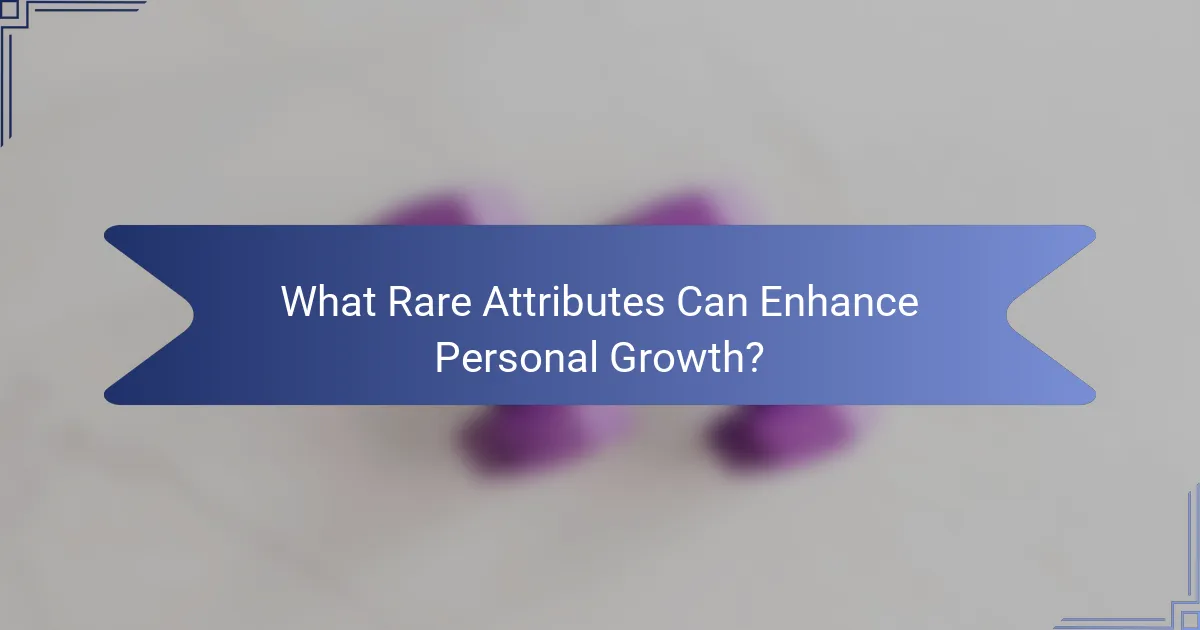
What Rare Attributes Can Enhance Personal Growth?
Cultivating rare attributes like resilience, adaptability, and self-awareness can significantly enhance personal growth. These psychological traits enable individuals to navigate challenges and foster a growth mindset. Resilience allows for recovery from setbacks, while adaptability helps in adjusting to new circumstances. Self-awareness promotes understanding of personal strengths and weaknesses, driving motivation and discipline. Developing these attributes creates a robust foundation for sustained personal development.
How Can Emotional Intelligence Affect Motivation and Discipline?
Emotional intelligence significantly enhances motivation and discipline by fostering self-awareness and self-regulation. Individuals with high emotional intelligence can better understand their emotions, which helps them set meaningful goals. This clarity boosts intrinsic motivation, leading to increased discipline in pursuing those goals.
Moreover, emotional intelligence enables effective stress management, allowing individuals to maintain focus and persistence even in challenging situations. By recognizing emotional triggers, they can adjust their responses, enhancing their ability to stay disciplined.
Research indicates that emotionally intelligent individuals are more resilient, which directly correlates with sustained motivation and discipline over time. This resilience allows them to overcome setbacks and remain committed to their personal growth journey.
What Is the Role of Grit in Sustaining Long-Term Goals?
Grit plays a crucial role in sustaining long-term goals by fostering resilience and perseverance. It empowers individuals to maintain focus and effort despite challenges. Research shows that individuals with high grit are more likely to achieve success over time, as they are less likely to give up when faced with obstacles. This psychological trait enhances motivation and discipline, making it essential for personal growth. Grit’s unique attribute lies in its ability to combine passion and persistence, driving individuals to pursue their long-term aspirations.
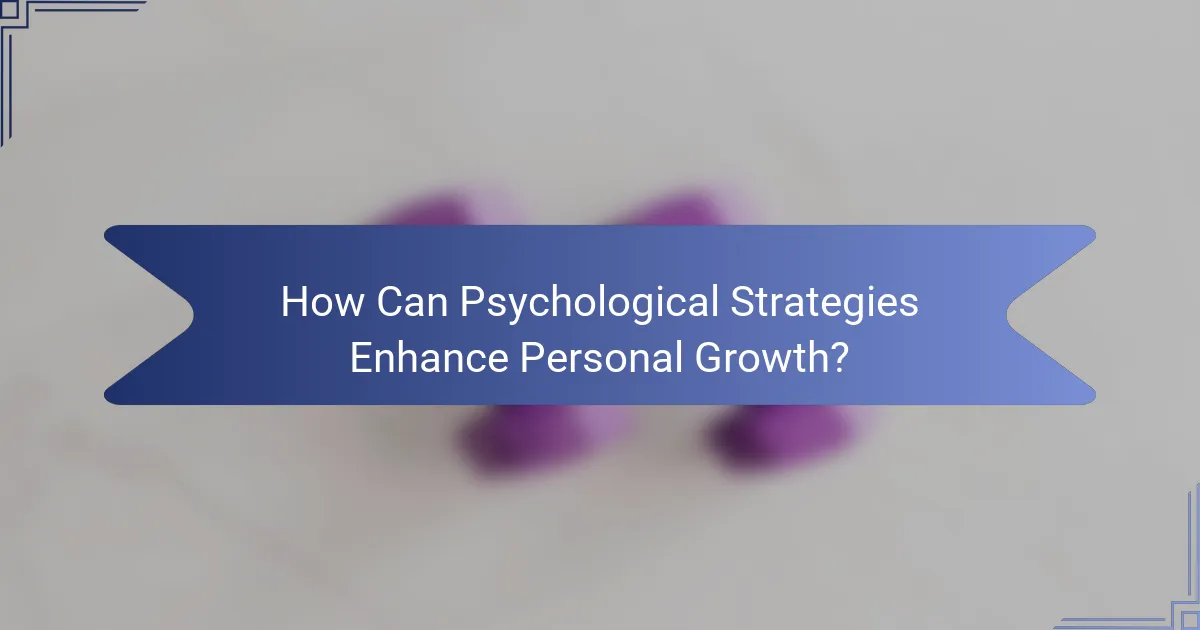
How Can Psychological Strategies Enhance Personal Growth?
Psychological strategies enhance personal growth by balancing motivation and discipline. Motivation drives initial action, while discipline sustains progress. Techniques like goal-setting and positive reinforcement strengthen this balance. Research indicates that individuals who employ both strategies achieve higher levels of personal growth. For example, a study found that consistent practice of self-discipline significantly improves goal attainment.
What Techniques Can Improve Motivation in Daily Life?
To improve motivation in daily life, employ techniques such as setting clear goals, practicing positive self-talk, and cultivating a growth mindset. These psychological strategies enhance personal growth and discipline.
Setting clear goals provides direction and measurable milestones, fostering accountability. Positive self-talk combats negative thoughts, reinforcing belief in one’s abilities. Cultivating a growth mindset encourages resilience, viewing challenges as opportunities for learning.
Incorporating these techniques can lead to sustainable motivation and improved discipline, ultimately unlocking personal growth.
How Can Individuals Cultivate Discipline Effectively?
To cultivate discipline effectively, individuals should establish clear goals, create structured routines, and practice self-control. Setting specific, measurable objectives enhances focus and motivation. Consistent routines reinforce positive habits, while techniques such as mindfulness can strengthen self-regulation. Incorporating accountability, like sharing goals with others, further supports discipline.
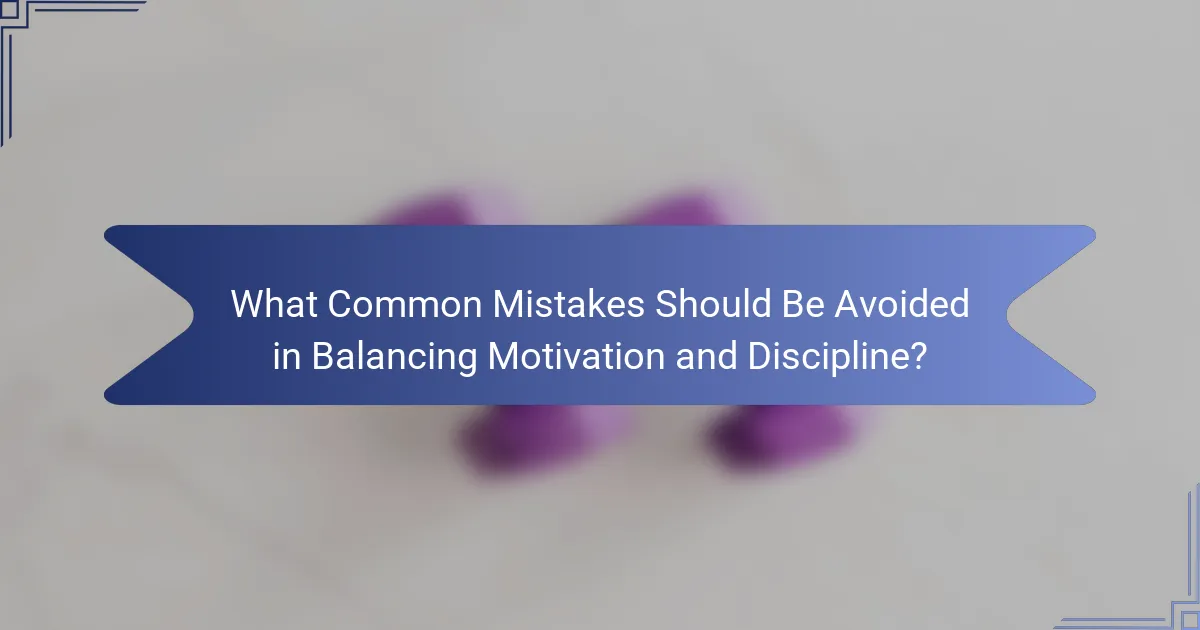
What Common Mistakes Should Be Avoided in Balancing Motivation and Discipline?
To effectively balance motivation and discipline, avoid common mistakes that hinder personal growth. One major mistake is relying solely on motivation, which can fluctuate, instead of establishing consistent discipline. Another error is neglecting to set specific, achievable goals, which can lead to frustration. Additionally, failing to track progress can diminish accountability and motivation. Lastly, overlooking the importance of self-reflection may prevent the identification of effective strategies.
What Best Practices Can Help Maximise Personal Growth?
To maximize personal growth, integrate motivation and discipline through specific psychological strategies. Setting clear goals enhances focus and commitment. Implementing a structured routine fosters discipline, while intrinsic motivation drives sustained effort. Regular self-reflection aids in identifying progress and areas for improvement. Embracing challenges cultivates resilience, ultimately unlocking greater personal potential.